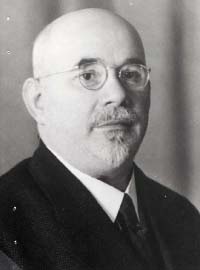Search for Names, Places and Biographies
Already layed Stumbling Stones
Suche
Gerson Stoppelman * 1879
Rutschbahn 11 (Eimsbüttel, Rotherbaum)
1942 Auschwitz
deportiert aus den Niederlanden
further stumbling stones in Rutschbahn 11:
Ilse Dotsch, Malka Goldberg, Hanna Heimann, Gerson Jacobsen, Regine Jacobsen, Ludwig Jacobsen, Klara (Clara) Jacobsen, Beer Lambig, Pescha Lambig, Senta Lambig, Samuel Lambig, Leo Lambig, Manuel Staub, Augusta Szpigiel
Gerson Stoppelman, b. 4.3.1879, deported from Holland to Auschwitz in 1942
Rutschbahn 11
Born on 4.3.1879 in Hamburg, Gerson Stoppelman was well-known inside the German Israelite Congregation of the Grindel quarter. In addition to his business activities, he had been active for years in congregational life. Moreover, he was a member of the Association of Independent Jewish Artisans and Businessmen of Greater Hamburg, a registered organization since 1906. In March 1930, he ran on the association’s list for the Representatives’ Committee of the Congregation. He was elected with 4,491 votes. Within the framework of his congregational office, Gerson Stoppelman repeatedly and vehemently advocated for the expansion of the welfare system of the German Israelite Congregation and for stronger support of the increasingly impoverished older congregational members.
For a few more years, Gerson Stoppelman also tried to maintain his butcher shop at Dillstrasse 16, which dealt in meat, sausage, and fowl, even after the prohibition of kosher slaughtering and despite the massive obstacles and losses in income. By 1937, he saw that there was no further basis for the business and applied to emigrate to Holland with his daughter Ilse who was still living with him. From there, he hoped to be able to travel to the USA where his daughters, Hedwig and Grete, had already emigrated. His wife had died in Hamburg in 1935.
The detailed, exact, and prolonged examination of his estate by the Hamburg Finance and Tax Office revealed that Gerson Stoppelman’s fortune consisted of a mortgage of 4,000 RM, unpaid outstanding claims on his dead wife’s insurance policy, and the furnishings of a butcher shop. By order of the Finance and Tax Office, his monetary funds were credited to a blocked account in the M. M. Warburg & Co., Limited Partnership; Gerson Stoppelman had no disposition over these funds. Nonetheless, he and his daughter received permission to emigrate.
A written statement from the Office of the Chief Financial Governor states:
"Mr. Gerson Stoppelman, most recently living in Hamburg 13, at 16 Dillstrasse (basement), has moved his residence abroad. According to §6, no. 6 of the Foreign Currency Law of 2.4.1935, Mr. Stoppelman is, in terms of his foreign currency status, considered a foreigner. Any disposition over his credit balances or the value of his estate respectively, according to directive I,1 of the Foreign Currency Law of 2.4.1935 constitutes an emigrant’s credit balance, that is, a blocked account, and therefore any payout to his favor made to a resident national requires … my approval.”
Gerson and Ilse Stoppelman traveled nearly penniless to Holland and were very soon dependent upon the support of Dutch refugee aid in Rotterdam, their first place of exile. Several letters from Gerson Stoppelman to the Office of the Chief Financial Governor requesting a payout of small amounts of interest (on his blocked account) to his impoverished sister Selma, living in Berlin, were not fulfilled, even though this had been allowed in the official permission to emigrate. The living conditions of father and daughter were also getting ever worse; they were completely dependent on the Rotterdam Refugee Committee and lived in a refugee camp there until nearly the end of 1939. The next address Gerson Stoppelman reported was in Amsterdam. Their exact circumstances during this period are not known. What is known is that his daughter Ilse married in Holland; all the further efforts of Gerson Stoppelman to have the Hamburg financial authorities transfer the credit balances from his blocked account, or even a small portion of them, remained fruitless. On 24 December 1939, he wrote the Foreign Currency Exchange Office:
"To the Foreign Currency Exchange Office in Hamburg, the undersigned directs this sincere request: that, with all due respect, the period of validity for the passage on the Holland America Line for travel to the USA, purchased for my daughter and myself on 15 November 1938, be extended to six months. At this time I am living here without any means or income and therefore am not in a position to be able to pay in foreign currency! I have queue numbers 8706/8707 and on that basis have good prospects of receiving a visa in the spring of 1940. I am truly desperate that I, a sixty-year old man, may not reach my goal of emigrating to be with my children. The official, Mr. Jahnike has knowledge of my case, that the Firm Carl L has not thus far sent my modest goods for relocation despite the fact that this was already legally approved with regard to customs and foreign currency exchange in December 1938. I beseech you to allow the pending dispatch of goods, as stipulated in writing, to Amsterdam (by ship if possible) because I cannot pay for them at the border. Most sincerely, I herewith direct this request to the Office of the Chief Financial Governor that he protect me against the loss of my last and only belongings and preserve the passage to the USA purchased in Nov. 1938. Hoping that my entreaty will be granted, I sign, with utmost respect and sincerity, Gerson Stoppelman.”
Gerson and Ilse Stoppelman fell victim to the occupation of Holland by German troops who immediately implemented systematic persecution of the Jews. Gerson Stoppelman was deported from the Netherlands to Auschwitz in 1942. His daughter Ilse Dotsch-Stoppelman was deported to Sobibor in 1943 and murdered there.
Translator: Richard Levy
Kindly supported by the Hermann Reemtsma Stiftung, Hamburg.
Stand: January 2019
© Ursula Wamser und Wilfried Weinke
Quelle: Auszug aus Ursula Wamser, Wilfried Weinke, "Eine verschwundene Welt – Jüdisches Leben am Grindel", zu Klampen Verlag, Springe 2006, S. 331 ff.


